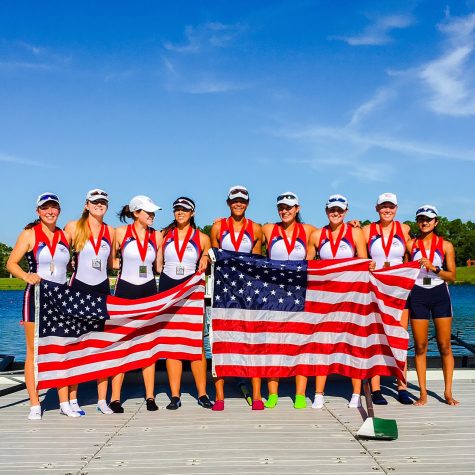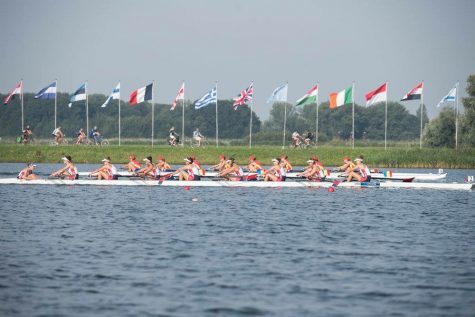A Turn in Events
November 11, 2016
Weeks before the end of school, just as her fellow classmates had begun to study for the semester finals, Burns packed her bags for New London, Connecticut. Having taken her finals early, Burns was off to participate in the 2016 High Performance rowing camp run through the Coast Guard Academy boathouse in New London. For two weeks Burns practiced with High Performance camp. She rowed on the Thames in New London—the same river that both Harvard and Yale crew teams practice on—and slept in the dorms of Connecticut College, enjoying the work of drills and technique. After rowing for two weeks with the High Performance camp, Burns was bumped into the next level training camp called “Selection”. Once there, Burns was being considered for CanAmMex, an international competition between the USA, Canada and Mexico.

After completing a 2000 meter erg (rowing machine) sprint, coaches at the camp were surprised at Burns’ speed, as she finished with third fastest time at the camp, and slated her to seat race for the Junior Worlds eight. Burns sadly did not make the cut after seat racing, Burns and good friend Jenna Van De Grift being the last two to not make the Junior team. Instead of joining the Junior team in racing, the girls went on to race at CanAmMex with their fellow Selection camp rowers. This event is regarded as less prestigious than Worlds, but still impressive. This year CanAmMex was held at Nathan Benderson park in Sarasota, Florida. There, the team won gold in both the eight and four3 event. “It was groundbreaking,” said Burns. “It was the first time that I really got [a] challenge, international competition.”
With two gold medals in hand, Burns returned home, content on starting training for Henley (a training camp hosted by WRC for the Canadian Henley competition). But after receiving a call not more than two weeks after returning to Ann Arbor, Burns returned to Princeton. There Burns and Van De Grift trained alongside the USA Junior team as spares.
Dropped into boats unexpectedly, Burns and the other girls learned to get to know each other quickly. “I feel like my growth as a person, not only as a rower, has tripled,” said Burns, saying that her social skills definitely improved by long strides this summer, just because of the amount of people she met. She was able to make a close knit group of friends during her time at Princeton who stuck together throughout the move from Princeton to Rotterdam, Amsterdam.
After weeks of workouts three times a day, seven days a week, the junior team set out for Rotterdam, their weeks of hard work all leading up to just over a week of racing. Losing her primary race against Germany, Burns finished racing earlier than many of her fellow rowers. Preparing to return to the hotel, Burns was unexpectedly asked to stay on at the course by coach Sandy Armstrong. Not racing in the eight the following day, Burns had thought she was finished racing. But Armstrong that evening sent Burns out in a scratch line up in the eight and in a “whatever looks better” decision subbed Burns in for the race the following day. Not making it straight to finals, Burns and her team were determined when they got on the water next to make it to the A- finals. In their last race, after long pep-talks and through months of training, the USA Junior Worlds women’s team took fifth in the women’s eight, four seconds ahead of the Romanian women’s team after competing closely with them throughout the preceding events. Burns began the summer with an already impressive rap of two Scholastic Nationals medals, but ended it with an even more impressive rap that boats international success as the fifth fastest junior women’s eight in the world.

